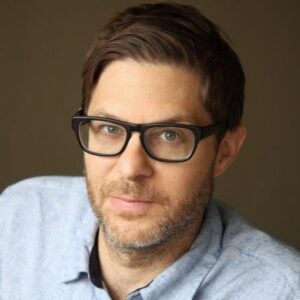President Carol L. Folt announces new inaugural vice provost for the arts
USC Annenberg Professor Kun hopes to create a collaborative arts vision across USC’s campuses
In recognition of the importance, relevance and collaborative spirit of the arts at USC, President Carol L. Folt on Thursday announced a new position at the university — vice provost for the arts — and named USC Annenberg School for Communication and Journalism Professor Josh Kun to the inaugural position. Folt and interim Provost Elizabeth Graddy are shaping a new vision to elevate and advance the arts throughout the university.
“Across our campuses and our 22 diverse schools, we embrace the arts at scale: within every program, linking disciplines and helping faculty, staff and students bridge gaps in truly uncommon ways,” Folt said.
“As vice provost for the arts, Josh will work closely with our arts deans and USC Museums to co-create and support collaborations that recognize and elevate the inspiring creative work happening here every day.”
In his new position, Kun said he looks forward to creating and facilitating this new arts vision that focuses on elevating the work of students, faculty and staff in the arts. He also looks forward to imagining innovative programs and partnerships with wider arts communities and industries.
“The incredible trust that the president and the provost are putting in me to create something new is a wonderful charge to get as a scholar, researcher and colleague,” Kun said. “I’m really excited to see what we build.”
As vice provost for the arts, Kun — who will remain on the USC Annenberg faculty and continue to teach and advis students — will partner with the university’s art schools and USC Museums to create universitywide “signature arts programs,” new initiatives and fundraising to “activate the arts” across USC and the broader Los Angeles arts community.
As part of this role, Kun will also serve as chair of a university Public Arts Committee tasked with creating a vision and a set of policies around managing public art on USC’s campuses.
Graddy said she believes the position is a perfect fit for USC — and for Kun.
“This announcement — and the new role of vice provost for the arts — represents an exciting chapter in the advancement of the arts at USC,” Graddy said. “I’m looking forward to working with Josh, our arts deans and museum leadership to increase opportunities for engagement in the arts across our campuses and communities.”
This isn’t the first time Kun — who has taught at USC for 17 years — has been appointed to a newly made position within the university. He is the inaugural chair in Cross-Cultural Communication at USC Annenberg, an endowed position that encourages leadership, innovation and research into how music and popular culture can encourage cross-cultural exchange. He also currently serves as the interim dean for the USC Thornton School of Music and is the founder and director of the Popular Music Project at USC Annenberg’s Norman Lear Center.
Early exposure to the power of the arts
Born and raised in Los Angeles, Kun says the city’s culture, music and Latinx arts communities heavily influenced his research interests and creative pursuits.
Calling himself a “lifelong music nerd,” Kun says his early experiences with L.A.’s live music scene exposed him to the ability of the arts to show different ways of understanding the world. “I fully appreciated the power that art has for allowing us to see through the eyes of bodies and histories that on the surface are not our own,” he said.
New USC vice provost for the arts bring a ‘crossfader’ mentality to the university arts scene
Cross-cultural exchange and creation have been the hallmark of Kun’s career. A well-known author, curator, music critic and cultural historian, Kun received his bachelor’s degree in literature from Duke University and a doctorate in ethnic studies from University of California, Berkeley.
It was during his time in the Bay Area, writing a weekly column as a freelance arts critic for the San Francisco Bay Guardian, that Kun realized that he could use music to connect to other artistic and cultural ideas. ”
That was really the moment my sensibility clicked,” Kun said. “One of the things I love about music is the way it creates unexpected alliances, opens unexpected doors and shows you how histories and communities are linked.”
Kun frequently uses the crossfader — a device DJs use to mix between two musical inputs — as a metaphor to describe that sensibility. “Part of my job in this role will be to find those connections and create new mixes between the arts worlds we have on campus, and the arts worlds of L.A. and beyond,” Kun said.
He has a long track record of writing and editing publications on the history and politics of cultural connection. These works include Audiotopia: Music, Race and America and a series of books with the Los Angeles Public Library including The Autograph Book of L.A.: Improvements on the Page of the City in 2019 and To Live and Dine in L.A.: Menus and the Making of the Modern City in 2015. Kun has also curated exhibitions and community-focused humanities projects with influential organizations such as The Getty Foundation, SFMOMA and the California African American Museum.
In 2016, he was selected as a fellow of the MacArthur Foundation. The foundation praised Kun’s unique use of the arts as conduits for cross-cultural exchange. A year later, he was also awarded the prestigious Berlin Prize to study the effect of immigration on music.
Teaching the arts in a global city
Kun said one of the things he loves about facilitating artistic connections across campuses is the way classroom material easily “explodes the physical boundaries and walls of the classroom.”
“To teach about the arts at USC is to be a part of a living ecosystem in L.A., where students really can get a sense that classroom material is not separate from everyday life,” Kun said. “You’re also teaching in a community of incredible diversity, where students are coming from different backgrounds and bring artistic histories to bear on the present work of the class.”
One of Kun’s main goals as vice provost for the arts will be to deepen and expand USC’s ability to tap into the professional pipeline between students and the city’s creative industries while engaging the university’s robust alumni networks. USC has six conservatory-level arts schools: the USC School of Architecture, the USC Kaufman School of Dance, the USC Thornton School of Music, the USC School of Dramatic Arts, the USC School of Cinematic Arts and the USC Roski School of Art and Design.
He believes this new appointment comes at an important moment in the country and around the world.
“We are living in the midst of deep cultural and political silos,” Kun said. “The arts are a really valuable and urgent language for creating little cracks in those armors of division. Globally, we need what artists are bringing more than ever before.”
Photo: Maggie Taplin



